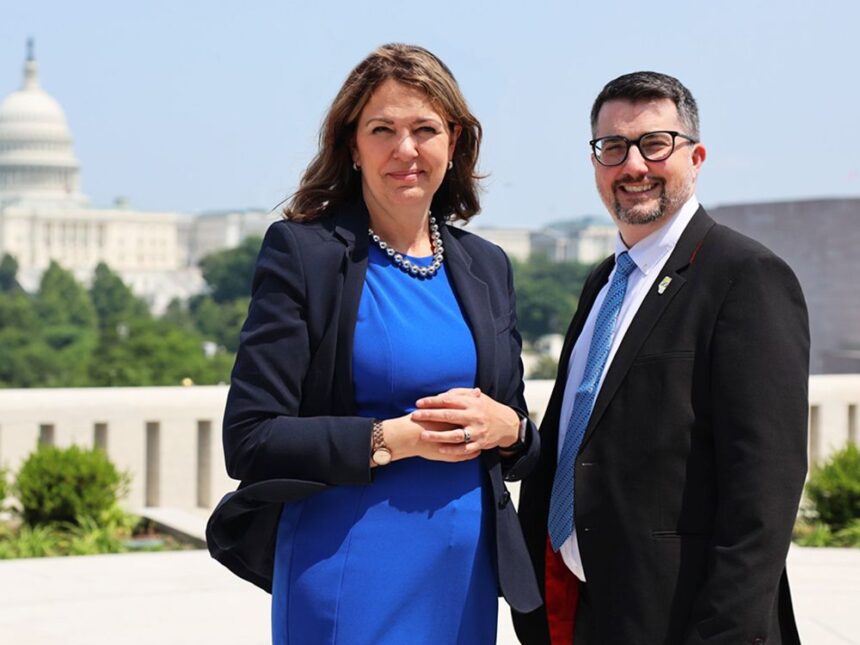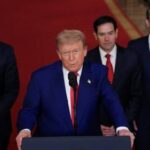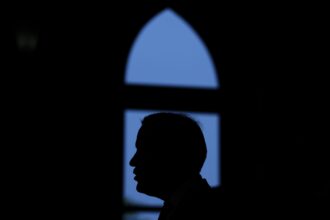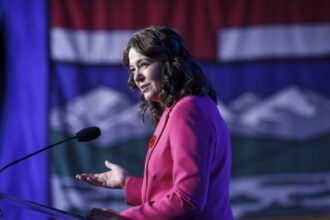In a bold political maneuver that signals Alberta’s intensifying push for autonomous representation on the international stage, Premier Danielle Smith has appointed former legislature speaker Nathan Cooper as the province’s new envoy to Washington. The selection comes at a critical juncture in Canada-U.S. relations, with energy policy and cross-border trade tensions reaching unprecedented levels under the Biden administration.
Cooper, who recently resigned his seat as the UCP MLA for Olds-Didsbury-Three Hills, steps into a role fraught with diplomatic complexities. His appointment represents Alberta’s growing frustration with federal representation of provincial interests in Washington—particularly concerning the province’s oil and gas sector, which has faced significant headwinds from U.S. environmental policies.
“The economic interests of Albertans must be championed directly with decision-makers in Washington,” Premier Smith stated during the announcement at the Alberta legislature. “Nathan brings the institutional knowledge and diplomatic temperament needed to navigate these sensitive corridors of power.”
The appointment marks a significant expansion of Alberta’s four-year-old Washington office, established under former premier Jason Kenney. Cooper joins a growing network of provincial representatives stationed in key global capitals, including Ottawa, Seoul, Tokyo, and several European centers. These offices collectively cost Alberta taxpayers approximately $7.7 million annually—an expense the Smith government defends as essential investment in promoting provincial economic interests.
Political analysts note that Cooper’s selection comes with both advantages and potential pitfalls. As a former Speaker, Cooper possesses considerable procedural expertise and institutional knowledge, but his limited experience in international diplomacy raises questions about his readiness for the high-stakes world of Washington politics.
“Provincial envoys operate in a delicate space,” explains Dr. Melissa Conley, international relations professor at the University of Calgary. “They must advance provincial interests without undermining federal diplomatic efforts—a balancing act that requires significant diplomatic finesse.”
Cooper’s immediate challenges include navigating the complex relationship between the Smith government and the Biden administration, whose climate policies have created friction with Alberta’s economic priorities. The province’s massive oil reserves—among the largest globally—represent both economic lifeblood for Alberta and a contentious environmental issue for U.S. policymakers.
The timing of Cooper’s appointment also coincides with heightened tensions surrounding energy infrastructure projects like Line 5, additional Canadian pipeline capacity, and the ongoing implementation of the U.S. Inflation Reduction Act, which contains provisions potentially disadvantageous to Canadian energy producers.
Premier Smith has made it clear that Cooper’s mission extends beyond traditional diplomatic courtesy. His mandate includes direct advocacy with congressional representatives, administration officials, and industry stakeholders on matters ranging from energy security to agricultural trade barriers.
“Alberta cannot afford to have its interests filtered through federal representatives who may not prioritize our economic concerns,” Smith emphasized. “Nathan’s presence in Washington gives us a direct voice where decisions affecting millions of Albertans are made daily.”
The federal government has maintained a cautiously supportive stance toward provincial international offices, acknowledging provinces’ right to promote their specific interests while emphasizing the importance of coordinated national foreign policy. Foreign Affairs Minister Mélanie Joly has indicated that federal diplomatic missions will continue providing support to provincial representatives like Cooper.
As Cooper prepares to take up his post in the coming weeks, questions remain about how effectively a provincial envoy can influence U.S. policy decisions, particularly when operating outside the full diplomatic infrastructure available to federal representatives. His success may ultimately determine whether other provinces follow Alberta’s lead in establishing more robust international diplomatic presences.
In an era of increasingly complex federalism and global economic interdependence, can provincial diplomacy effectively complement national efforts, or does it risk fragmenting Canada’s international voice when unity might better serve all Canadians?
















